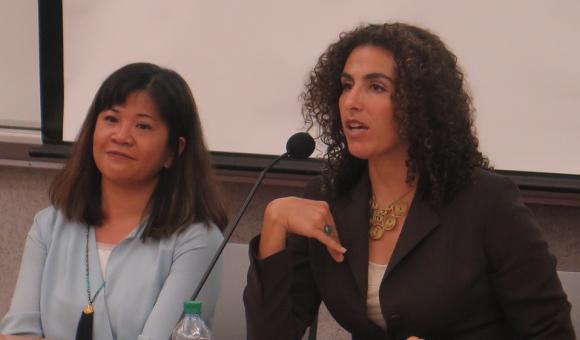
Professor Rose Cuison Villazor, left, and Professor Sahar Aziz, right, discuss contemporary and historical bias in American immigration policies.
Professor Rose Cuison Villazor, in the inaugural event for the Rutgers Center for Immigration Law, Policy and Justice, presented a clip of a documentary about the Chinese Exclusion Act and organized a panel discussion on parallels between the exclusion of Chinese and other Asian immigrants to the United States and the restrictions and racism being experienced by Muslim immigrants and their families today.
The film recounted the years after the Civil War when the United States depended on Chinese workers to complete reconstruction projects – including working on railroads and at businesses in California during the latter part of the 1800s.
It pointed out that by the 1860s, Congress began efforts to restrict those workers, first prohibiting contract workers, then prohibiting Chinese women because they were suspected of being prostitutes. As such, by 1875, there were 78 women for every 1,000 Chinese men in the United States. Then, in 1882, Congress passed the Chinese Exclusion Act, the country’s first travel ban that explicitly did so on the grounds of race.
And, the film noted, during the national election in 1876, both Republicans and Democrats favored excluding Chinese from the United States and scapegoated them as an ethnic group that was hurting white working men and taking jobs away from whites. That resulted in personal attacks on Chinese people living in the United States. Mobs and individuals burned their buildings and committed violence against them. Additional restrictions on passenger ships further limited immigration.
Villazor began the discussion by pointing out that racial stereotyping and bias seen in political cartoons played a role in public sentiment at the time. Then, the Supreme Court in the case of Chae Chan Ping v. United States, which it decided in 1889, upheld the Chinese Exclusion Act. As Villazor explained, the Court based its opinion on both national security grounds and the view that Chinese could not be assimilated.
She said parallels can be seen between the actions excluding Chinese and current restrictions against Muslims coming to the U.S.
Rutgers Law Co-Dean David Lopez, who participated in the panel discussion, said the repercussions of the Chinese Exclusion Act were felt among additional ethnic and racial groups, including Latinos and African-Americans, in later years. He cited the Plessy v. Ferguson decision, which upheld racial segregation as an example, “The judges didn’t have the world view to understand this type of racial subordination.”
Professor Sahar Aziz, an expert in civil rights and founder of the Rutgers Center for Security, Race and Rights, noted that statements President Trump made about immigrants and Muslims after taking office were reminiscent of the past, including those used to justify the Chinese Exclusion Act. “These underlying concepts have always existed,” she said.
Aziz said politicians and others in power, who were generally white men, have long portrayed immigrants and foreigners as uncivilized, unable to assimilate, dangerous, exotic, scary, hypersexual and secretive, in order to justify immigration quotas and other laws. In addition, they pitted low-income wage earners from immigrant and ethnic groups against white low-income wage earners, a tactic that has been used recently against Hispanic people.
“We are not even close to be out the woods when it comes to racial issues,” she said. “We are not post racial.”
She challenged people of all backgrounds – whether Asian, Latinx, Caucasian or other backgrounds to rise up and stand up for each other, “We can aspire to be exceptional or continue repeating the mistakes of history.”
Lopez added that similar justifications were used for Japanese interment during World War II, “It was law based on racialized stereotypes. . .Now we know it’s a racial abomination.”
He said many examples can be seen throughout history, castigating different ethnic groups during different periods of time, “The dynamic happens over and over again.”
The event was co-sponsored by APALSA, the Rutgers Center for Security, Race and Rights, the Rutgers Center for Gender, Sexuality, Law & Policy, and the Center for Asian American Media.